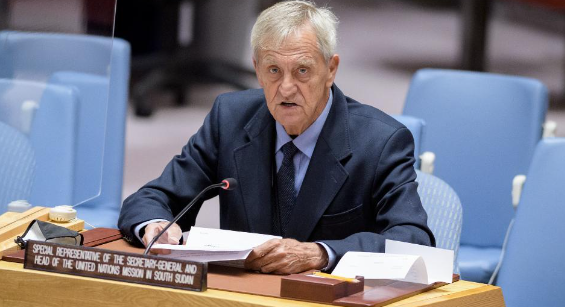The Special Representative of the Secretary-General and Head of the United Nations Mission in South Sudan (UNMISS) on Tuesday, while briefing the UN Security Council, warned that the crisis in Sudan has had major implications for the implementation of South Sudan’s revitalized peace agreement.
Nicholas Haysom noted a series of challenges impeding the progress of the country’s peace agreement, chief among them an influx of refugees from Sudan, escalating violence in Malakal, and the need to establish civic and political space before conducting credible elections.
He warned that South Sudan’s absorption capacity is under significant strain and that since mid-April, more than 117,000 individuals have migrated from Sudan to South Sudan, exacerbating the latter’s already fragile economic situation.
“On the political side, the conflict in Sudan reduces the much-needed bandwidth (both domestic and international) to focus attention on South Sudan during this critical phase of its transition. While President Kiir and IGAD’s efforts to end the conflict in Sudan remain commendable, the timeline of the peace process in South Sudan should not be allowed to become the opportunity cost of these efforts,” he noted. “In South Sudan, these factors are exacerbating the existing triggers and drivers of conflict – complicating an already tenuous security situation across the country. For example, reports of northern migratory cattle herders refusing to return to Sudan are concerning. The absence of local agreements governing the movement of cattle outside the dry season heightens the risk of clashes between the northern pastoralists and South Sudanese agrarian communities.”
According to Haysom, the recent escalation of violence in the city of Malakal adds to the broader network of intercommunal conflicts that UNMISS is grappling with. He said that attacks on humanitarian actors are unacceptable.
“Now is not the time to take our eyes off the ball in South Sudan,” he told the Council. “Our intention is to extend the force’s footprint across the country while still retaining reserves for addressing intercommunal and subnational and pre-electoral contingencies.”
Haysom noted that South Sudan is not yet ready to roll out an electoral process and said that no electoral process can be credible without adequate civic and political space.
“The challenges are many, but I am hopeful that with cooperation, partnership, and sustained leadership a positive change in the lives of the South Sudanese can be achieved,” he said.
Also briefing the Council, the Interim Chairperson of the Reconstituted Joint Monitoring and Evaluation Commission (RJMEC), Major General Charles Tai Gituai, said the main challenges slowing the progress of the 2018 Revitalized Peace Agreement include a trust deficit among the parties, lack of adequate resources, persistent levels of intercommunal violence and natural calamities, such as floods.
Gituai added that several benchmarks are needed so that elections, scheduled to be held in December 2024, are free and credible, including completion of the unification and redeployment of forces, in order to provide election-related security and the reconstitution of institutions tasked with preparing and carrying out elections.
For his part, Marc Impagliazzo, the President of the Community of Sant’Egidio, said that the Community’s initiative in South Sudan called the Rome Initiative, has a full mandate from South Sudanese President Salva Kiir Mayardit to negotiate with non-signatories to the Revitalized Peace Agreement.
He said this dialogue has reduced violence in the country and created hope for peace.




